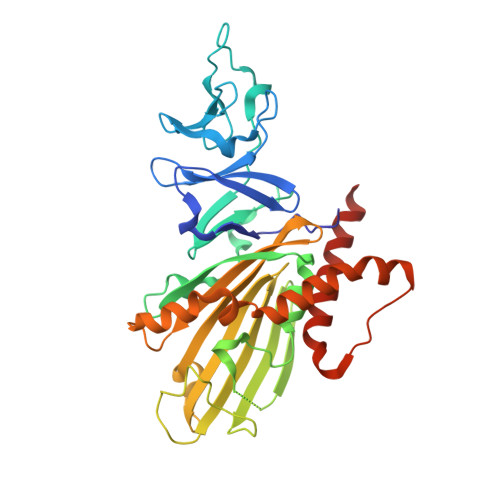Dicamba monooxygenase: structural insights into a dynamic Rieske oxygenase that catalyzes an exocyclic monooxygenation.
D'Ordine, R.L., Rydel, T.J., Storek, M.J., Sturman, E.J., Moshiri, F., Bartlett, R.K., Brown, G.R., Eilers, R.J., Dart, C., Qi, Y., Flasinski, S., Franklin, S.(2009) J Mol Biology 392: 481-497
- PubMed: 19616009
- DOI: https://doi.org/10.1016/j.jmb.2009.07.022
- Primary Citation of Related Structures:
3GB4, 3GOB, 3GTE, 3GTS, 6VSH - PubMed Abstract:
Dicamba (2-methoxy-3,6-dichlorobenzoic acid) O-demethylase (DMO) is the terminal Rieske oxygenase of a three-component system that includes a ferredoxin and a reductase. It catalyzes the NADH-dependent oxidative demethylation of the broad leaf herbicide dicamba. DMO represents the first crystal structure of a Rieske non-heme iron oxygenase that performs an exocyclic monooxygenation, incorporating O(2) into a side-chain moiety and not a ring system. The structure reveals a 3-fold symmetric trimer (alpha(3)) in the crystallographic asymmetric unit with similar arrangement of neighboring inter-subunit Rieske domain and non-heme iron site enabling electron transport consistent with other structurally characterized Rieske oxygenases. While the Rieske domain is similar, differences are observed in the catalytic domain, which is smaller in sequence length than those described previously, yet possessing an active-site cavity of larger volume when compared to oxygenases with larger substrates. Consistent with the amphipathic substrate, the active site is designed to interact with both the carboxylate and aromatic ring with both key polar and hydrophobic interactions observed. DMO structures were solved with and without substrate (dicamba), product (3,6-dichlorosalicylic acid), and either cobalt or iron in the non-heme iron site. The substitution of cobalt for iron revealed an uncommon mode of non-heme iron binding trapped by the non-catalytic Co(2+), which, we postulate, may be transiently present in the native enzyme during the catalytic cycle. Thus, we present four DMO structures with resolutions ranging from 1.95 to 2.2 A, which, in sum, provide a snapshot of a dynamic enzyme where metal binding and substrate binding are coupled to observed structural changes in the non-heme iron and catalytic sites.
- Monsanto Company, Chesterfield MO 63017, USA. robert.l.d'ordine@monsanto.com
Organizational Affiliation:
















